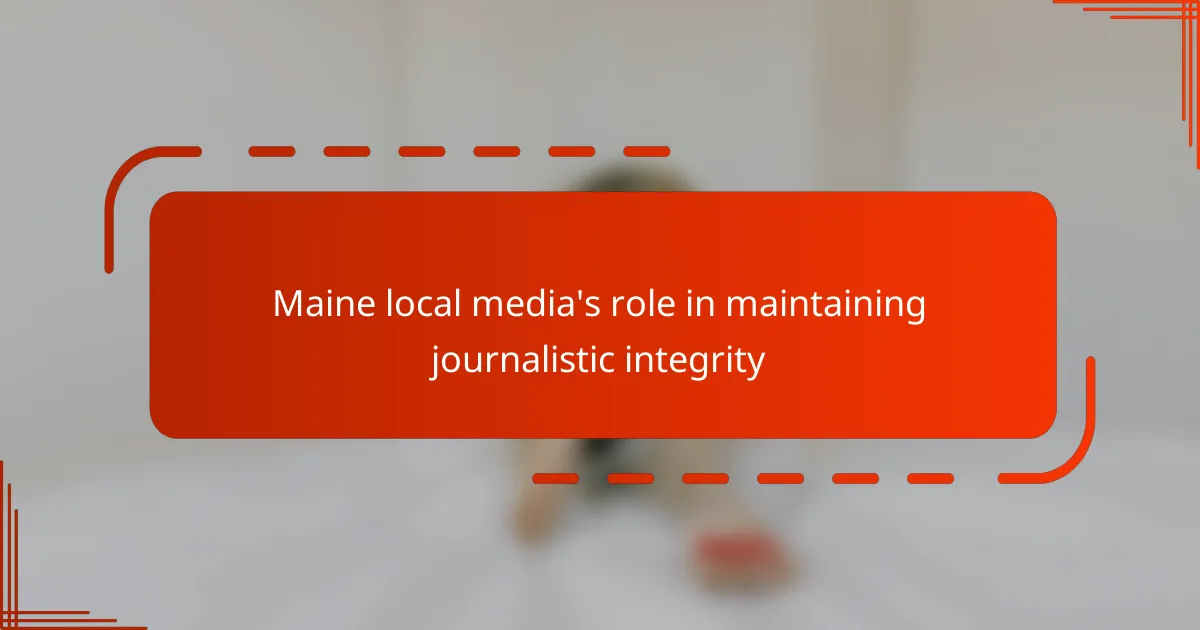Maine local media organizations play a vital role in upholding journalistic integrity by providing accurate and reliable information to the public. These outlets act as watchdogs, holding those in power accountable and ensuring transparency in governance through adherence to ethical standards, including fact-checking and sourcing. They engage with communities to foster trust and encourage civic participation, which is essential for an informed electorate and a functioning democracy. However, emerging trends such as digital media competition, social media influence, and audience fragmentation pose challenges to maintaining these standards. The commitment to ethical journalism remains crucial as local media navigates the evolving landscape of information dissemination.

What is the role of Maine local media in maintaining journalistic integrity?
Maine local media plays a crucial role in maintaining journalistic integrity by providing accurate and reliable information to the public. Local news outlets serve as watchdogs, holding power accountable and ensuring transparency in governance. They adhere to ethical standards, such as fact-checking and sourcing, which uphold credibility. For instance, the Maine Press Association promotes ethical journalism among its members, reinforcing the importance of integrity. Additionally, local media engages with communities, fostering trust and encouraging civic participation. This relationship helps to create an informed electorate, essential for a functioning democracy. Overall, Maine local media is vital in promoting accountability and maintaining public trust through responsible journalism.
How does Maine local media define journalistic integrity?
Maine local media defines journalistic integrity as the commitment to truthful, accurate, and fair reporting. This definition emphasizes the importance of verifying facts before publication. Journalists are expected to remain independent and avoid conflicts of interest. Ethical standards guide their conduct, ensuring accountability to the public. Local media organizations often adhere to codes of ethics established by professional associations. These codes reinforce the necessity of transparency in sourcing information. By prioritizing integrity, Maine local media builds trust with its audience. Trust is essential for fostering informed communities and promoting democratic engagement.
What are the core principles of journalistic integrity in Maine media?
The core principles of journalistic integrity in Maine media include accuracy, fairness, independence, and accountability. Accuracy ensures that information is verified and reported truthfully. Fairness involves providing balanced coverage and representing diverse viewpoints. Independence means journalists operate free from outside influences or conflicts of interest. Accountability requires media organizations to take responsibility for their reporting and correct errors when they occur. These principles are essential for maintaining public trust and credibility in the media landscape of Maine.
How do these principles manifest in daily reporting practices?
These principles manifest in daily reporting practices through adherence to accuracy, transparency, and fairness. Local media in Maine prioritize fact-checking before publication. They often rely on credible sources and provide context for the information shared. Transparency is maintained by disclosing potential conflicts of interest. Fairness is achieved by presenting multiple viewpoints in news stories. These practices help build trust within the community. Research shows that local news organizations that uphold these principles have higher audience credibility ratings. This reinforces the importance of integrity in journalism.
Why is journalistic integrity important for local communities in Maine?
Journalistic integrity is crucial for local communities in Maine because it fosters trust between the media and the public. Trust in media leads to informed citizens who can engage in local governance. Accurate reporting helps communities understand critical issues affecting them, such as public health and safety. When local media uphold integrity, they provide a platform for diverse voices and opinions. This inclusivity strengthens community bonds and promotes civic engagement. Furthermore, reliable journalism can hold local leaders accountable, ensuring transparency in governance. In Maine, where many towns rely on local news, integrity is vital for maintaining a well-informed electorate. Studies show that communities with strong local journalism experience higher voter turnout and civic participation.
How does journalistic integrity impact public trust in local media?
Journalistic integrity significantly enhances public trust in local media. When local media uphold ethical standards, they provide accurate and reliable information. This reliability fosters a sense of credibility among the audience. Studies show that communities with trustworthy local news sources report higher levels of civic engagement. For instance, a Pew Research Center study found that 71% of Americans believe that local news organizations are essential for democracy. Additionally, consistent ethical reporting reduces misinformation, further solidifying public confidence. Therefore, journalistic integrity is crucial for maintaining and boosting public trust in local media outlets.
What role does integrity play in informing civic engagement among Maine residents?
Integrity is crucial in informing civic engagement among Maine residents. It fosters trust between the media and the public. When local media uphold integrity, they provide accurate and reliable information. This empowers residents to make informed decisions. Trustworthy reporting encourages participation in civic activities. Research shows that communities with high media integrity have more engaged citizens. For example, a study by the Pew Research Center found that reliable news sources increase public involvement in local issues. Thus, integrity in journalism directly influences civic engagement in Maine.
What challenges does Maine local media face in maintaining journalistic integrity?
Maine local media faces significant challenges in maintaining journalistic integrity. One major challenge is financial instability. Many local news outlets struggle with declining advertising revenues. This financial pressure can lead to cutbacks in staff and resources. Limited resources often result in a lack of thorough investigative reporting. Additionally, local media may face competition from larger, national news organizations. This competition can dilute the focus on local issues.
Another challenge is audience trust. Misinformation and sensationalism can undermine public confidence in local news. Moreover, political polarization can influence how news is reported. Journalists may face pressure from various stakeholders to align with specific viewpoints. These factors collectively hinder the ability of Maine local media to uphold high standards of journalistic integrity.
How do economic pressures affect journalistic standards in Maine?
Economic pressures significantly impact journalistic standards in Maine. Reduced funding leads to fewer resources for investigative reporting. Many local news outlets face layoffs and budget cuts. This often results in a reliance on less thorough reporting methods. Journalists may prioritize speed over accuracy due to time constraints. The competition for advertising revenue can compromise editorial independence. Nonprofit and community-funded models are emerging as alternatives. These models aim to sustain quality journalism despite economic challenges.
What external influences can compromise journalistic integrity in local reporting?
External influences that can compromise journalistic integrity in local reporting include political pressure, financial constraints, and community biases. Political pressure often leads to biased reporting, as journalists may face repercussions for unfavorable coverage. Financial constraints can limit resources, resulting in less thorough investigations and reliance on less credible sources. Community biases may affect the objectivity of reporting, as local journalists may prioritize the views of their audience over factual accuracy. These influences can ultimately distort the truth and undermine the credibility of local media.

How do Maine local media organizations uphold journalistic integrity?
Maine local media organizations uphold journalistic integrity by adhering to ethical guidelines and standards. They prioritize accuracy, fairness, and transparency in their reporting. Many organizations implement fact-checking processes to verify information before publication. They also provide clear sources for their stories, allowing readers to assess credibility. Additionally, local media often engage with their communities to ensure diverse perspectives are represented. This includes hosting public forums and soliciting feedback from audiences. By maintaining accountability through editorial oversight, these organizations foster trust with their readership. Many local outlets are members of professional journalism associations that promote ethical practices, further reinforcing their commitment to integrity.
What practices do Maine local media implement to ensure ethical reporting?
Maine local media implement several practices to ensure ethical reporting. They adhere to established journalistic standards, such as accuracy, fairness, and transparency. Local news organizations often engage in fact-checking to verify information before publication. They also provide context to news stories to help readers understand the issues at hand.
Many outlets emphasize the importance of separating news from opinion. This practice helps maintain objectivity in reporting. Additionally, they often have editorial guidelines that outline ethical standards for journalists. Some media organizations conduct regular training sessions on ethical journalism for their staff.
Maine’s local media also encourage community feedback, allowing the public to voice concerns about reporting practices. This engagement fosters accountability and trust between the media and the communities they serve. Overall, these practices contribute to the integrity of journalism in Maine.
How do editorial guidelines contribute to maintaining integrity?
Editorial guidelines contribute to maintaining integrity by establishing standards for accuracy and fairness. These guidelines ensure that journalists verify facts before publication. They promote transparency in sourcing and reporting. Consistent adherence to these guidelines builds public trust. Research shows that media organizations with strong editorial standards are viewed as more credible. For instance, a study by the Pew Research Center found that audiences value transparency in reporting. This reinforces the notion that editorial guidelines are essential for upholding journalistic integrity.
What role does fact-checking play in the reporting process?
Fact-checking is essential in the reporting process to ensure accuracy and credibility. It involves verifying information before publication. This practice helps prevent the spread of misinformation. Journalists cross-reference facts with reliable sources. Fact-checking builds trust with the audience. It also upholds the ethical standards of journalism. Inaccurate reporting can damage reputations and mislead the public. Therefore, fact-checking is a critical step in maintaining journalistic integrity.
How does community involvement influence journalistic integrity in Maine?
Community involvement enhances journalistic integrity in Maine by fostering accountability and transparency. When local communities actively engage with media outlets, they promote a culture of trust. This interaction encourages journalists to uphold ethical standards. Community feedback can lead to more accurate reporting. It also helps identify issues that matter to residents. In Maine, local news organizations often rely on community input to shape their coverage. For instance, public forums and town hall meetings allow residents to voice concerns. Research indicates that such involvement can increase public trust in media. A study by the Pew Research Center found that community engagement correlates with higher perceived credibility of local news. Therefore, community involvement is crucial for maintaining journalistic integrity in Maine.
What initiatives encourage public participation in local news reporting?
Initiatives that encourage public participation in local news reporting include community journalism programs, citizen journalism workshops, and local news collaboratives. These initiatives aim to engage residents in the news creation process. Community journalism programs often provide training for locals to report on issues that matter to them. Citizen journalism workshops empower individuals to share their perspectives through various media platforms. Local news collaboratives foster partnerships between traditional media and community members to enhance coverage of local issues. Research shows that these initiatives can increase public trust in local news. They also help ensure diverse voices are represented in reporting.
How does feedback from the community shape media practices?
Feedback from the community significantly shapes media practices by influencing content focus and editorial decisions. Local media outlets often rely on community input to identify relevant issues. This feedback can lead to changes in reporting styles and topics covered. For example, when community members express concerns about local governance, media may prioritize investigative journalism in that area. Studies show that community engagement fosters trust between media and the public. Research by the Pew Research Center indicates that 70% of local news consumers value responsiveness to their feedback. Such responsiveness can enhance journalistic integrity by aligning media practices with community needs.
What are some success stories of Maine local media maintaining integrity?
Maine local media has successfully maintained integrity through various initiatives. The Bangor Daily News has upheld transparency by publishing corrections and clarifications promptly. This practice builds trust with readers and fosters accountability. Additionally, the Portland Press Herald has focused on investigative journalism that uncovers local issues. Their reporting on the opioid crisis highlighted the need for community action, leading to policy changes. Local news outlets also engage in community forums, allowing public discourse and feedback. This approach strengthens their connection with the audience and ensures diverse perspectives are represented. These examples illustrate how Maine local media prioritizes integrity and serves the public interest.
Which local media outlets are recognized for their commitment to ethical journalism?
Maine local media outlets recognized for their commitment to ethical journalism include the Portland Press Herald and the Bangor Daily News. The Portland Press Herald has received accolades for its investigative reporting and adherence to ethical standards. The Bangor Daily News is known for its transparency and community-focused journalism. Both outlets have established editorial guidelines that promote accountability and integrity in reporting. Their commitment is reflected in their coverage of local issues and engagement with the community.
What impact have these success stories had on the community’s perception of media?
Success stories have significantly improved the community’s perception of media. They demonstrate the media’s positive influence on local issues. This has fostered trust between the community and media outlets. Increased transparency in reporting has been a key factor. For instance, local investigations have led to accountability in government actions. As a result, community engagement with media has risen. People are more likely to consume local news. This shift enhances the overall credibility of local journalism.

What future trends may affect Maine local media’s journalistic integrity?
Future trends that may affect Maine local media’s journalistic integrity include the rise of digital media and social media influence. Digital media has transformed how news is consumed, leading to increased competition and a struggle for ad revenue. This financial pressure can compromise journalistic standards and lead to sensationalism.
Social media platforms often prioritize engagement over accuracy, which can encourage the spread of misinformation. The prevalence of user-generated content can blur the lines between professional journalism and amateur reporting.
Additionally, audience fragmentation may result in echo chambers, where local media caters to specific political or ideological groups. This can further erode trust in journalism by promoting biased reporting.
Emerging technologies like AI may also impact content creation and distribution, raising ethical concerns regarding authenticity and accountability. As these trends evolve, maintaining journalistic integrity will be a significant challenge for Maine’s local media landscape.
How is technology changing the landscape of local journalism in Maine?
Technology is transforming local journalism in Maine by enhancing accessibility and engagement. Digital platforms allow news outlets to reach wider audiences. Social media enables real-time reporting and community interaction. Mobile applications provide instant updates on local news. Data journalism tools improve the depth and quality of reporting. Online subscriptions and crowdfunding are emerging revenue models. According to the Pew Research Center, 64% of Americans now get news from social media. This shift requires local journalists to adapt to new storytelling methods. Overall, technology is reshaping how news is produced and consumed in Maine.
What are the implications of social media on journalistic practices?
Social media significantly influences journalistic practices. It alters how news is reported, disseminated, and consumed. Journalists now rely on social media for real-time news updates. This shift leads to faster reporting but may compromise accuracy. The pressure to publish quickly can result in incomplete or misleading information. Social media also enables direct audience engagement, allowing journalists to interact with readers. This interaction can enhance transparency but may also lead to biased reporting. Furthermore, the prevalence of misinformation on social media complicates the journalistic landscape. Journalists must now navigate these challenges to uphold integrity in their work.
How can local media adapt to new technologies while maintaining integrity?
Local media can adapt to new technologies by embracing digital platforms while upholding journalistic integrity. They should invest in training staff on ethical reporting in a digital landscape. Utilizing fact-checking tools can help ensure accuracy in fast-paced news cycles. Engaging with the community through social media fosters transparency and accountability. Implementing strict editorial guidelines can safeguard against misinformation. Collaborating with technology experts can enhance understanding of emerging tools. Regularly assessing the impact of technology on reporting practices is essential. This approach allows local media to innovate while maintaining trust with their audience.
What best practices can Maine local media adopt to strengthen journalistic integrity?
Maine local media can strengthen journalistic integrity by implementing transparent editorial policies. These policies should clearly outline the standards for sourcing and reporting. Regular training on ethical journalism practices is essential for all staff members. Establishing a system for fact-checking before publication can prevent misinformation. Engaging with the community fosters trust and encourages feedback. Collaboration with other reputable news organizations can enhance credibility. Finally, maintaining independence from political and commercial influences is crucial for unbiased reporting.
How can continuous training and education enhance ethical reporting?
Continuous training and education can enhance ethical reporting by equipping journalists with updated knowledge and skills. It fosters a deeper understanding of ethical standards and practices in journalism. Training programs often include case studies that illustrate ethical dilemmas. These scenarios help journalists recognize and navigate complex situations in real time. Education also emphasizes the importance of accuracy and accountability in reporting. According to a study by the Pew Research Center, journalists who engage in ongoing training are more likely to adhere to ethical guidelines. This commitment ultimately strengthens public trust in the media.
What role does collaboration among local media outlets play in upholding standards?
Collaboration among local media outlets plays a crucial role in upholding standards. It enables information sharing and resource pooling, enhancing fact-checking processes. Joint efforts often lead to more comprehensive coverage of local issues. This collaboration fosters accountability among journalists. When outlets work together, they can cross-verify information, reducing the likelihood of misinformation. Studies show that collaborative journalism can improve public trust in media. For example, initiatives like the Maine Media Collaborative have demonstrated increased accuracy and reliability in reporting. These partnerships ultimately strengthen the overall integrity of local journalism.
What practical tips can local journalists in Maine follow to maintain integrity?
Local journalists in Maine can maintain integrity by adhering to ethical journalism standards. They should fact-check all information before publication. This reduces the risk of disseminating false information. Journalists must disclose any conflicts of interest. Transparency builds trust with the audience. They should seek diverse perspectives on issues. This ensures balanced reporting. Journalists must respect the privacy of individuals. This protects personal information from unnecessary exposure. They should engage with the community. Understanding local concerns fosters responsible reporting. Regular training on ethical practices is essential. This keeps journalists informed about evolving standards. Following these tips will help maintain credibility and public trust.
Maine local media is a crucial entity in upholding journalistic integrity by delivering accurate and reliable information to the public. The article explores how local news outlets serve as watchdogs, promote transparency, and engage communities, thereby fostering trust and civic participation. Key principles of journalistic integrity, such as accuracy, fairness, independence, and accountability, are discussed along with the challenges faced by local media, including financial pressures and audience trust issues. Additionally, the article highlights best practices, community involvement, and the impact of technology on maintaining ethical journalism standards in Maine.
